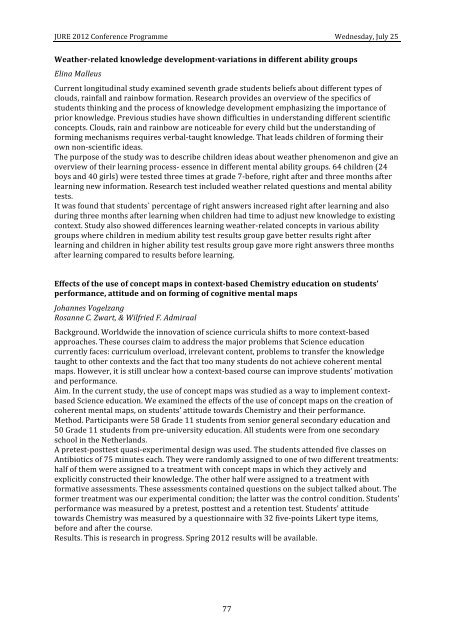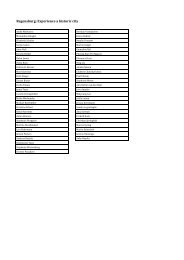JURE 2012 Programme book - EARLI Jure 2012
JURE 2012 Programme book - EARLI Jure 2012
JURE 2012 Programme book - EARLI Jure 2012
Create successful ePaper yourself
Turn your PDF publications into a flip-book with our unique Google optimized e-Paper software.
<strong>JURE</strong> <strong>2012</strong> Conference <strong>Programme</strong> Wednesday, July 25<br />
Weather-‐related knowledge development-‐variations in different ability groups<br />
Elina Malleus<br />
Current longitudinal study examined seventh grade students beliefs about different types of<br />
clouds, rainfall and rainbow formation. Research provides an overview of the specifics of<br />
students thinking and the process of knowledge development emphasizing the importance of<br />
prior knowledge. Previous studies have shown difficulties in understanding different scientific<br />
concepts. Clouds, rain and rainbow are noticeable for every child but the understanding of<br />
forming mechanisms requires verbal-‐taught knowledge. That leads children of forming their<br />
own non-‐scientific ideas.<br />
The purpose of the study was to describe children ideas about weather phenomenon and give an<br />
overview of their learning process-‐ essence in different mental ability groups. 64 children (24<br />
boys and 40 girls) were tested three times at grade 7-‐before, right after and three months after<br />
learning new information. Research test included weather related questions and mental ability<br />
tests.<br />
It was found that students` percentage of right answers increased right after learning and also<br />
during three months after learning when children had time to adjust new knowledge to existing<br />
context. Study also showed differences learning weather-‐related concepts in various ability<br />
groups where children in medium ability test results group gave better results right after<br />
learning and children in higher ability test results group gave more right answers three months<br />
after learning compared to results before learning.<br />
Effects of the use of concept maps in context-‐based Chemistry education on students’<br />
performance, attitude and on forming of cognitive mental maps<br />
Johannes Vogelzang<br />
Rosanne C. Zwart, & Wilfried F. Admiraal<br />
Background. Worldwide the innovation of science curricula shifts to more context-‐based<br />
approaches. These courses claim to address the major problems that Science education<br />
currently faces: curriculum overload, irrelevant content, problems to transfer the knowledge<br />
taught to other contexts and the fact that too many students do not achieve coherent mental<br />
maps. However, it is still unclear how a context-‐based course can improve students’ motivation<br />
and performance.<br />
Aim. In the current study, the use of concept maps was studied as a way to implement context-‐<br />
based Science education. We examined the effects of the use of concept maps on the creation of<br />
coherent mental maps, on students’ attitude towards Chemistry and their performance.<br />
Method. Participants were 58 Grade 11 students from senior general secondary education and<br />
50 Grade 11 students from pre-‐university education. All students were from one secondary<br />
school in the Netherlands.<br />
A pretest-‐posttest quasi-‐experimental design was used. The students attended five classes on<br />
Antibiotics of 75 minutes each. They were randomly assigned to one of two different treatments:<br />
half of them were assigned to a treatment with concept maps in which they actively and<br />
explicitly constructed their knowledge. The other half were assigned to a treatment with<br />
formative assessments. These assessments contained questions on the subject talked about. The<br />
former treatment was our experimental condition; the latter was the control condition. Students’<br />
performance was measured by a pretest, posttest and a retention test. Students’ attitude<br />
towards Chemistry was measured by a questionnaire with 32 five-‐points Likert type items,<br />
before and after the course.<br />
Results. This is research in progress. Spring <strong>2012</strong> results will be available.<br />
77



